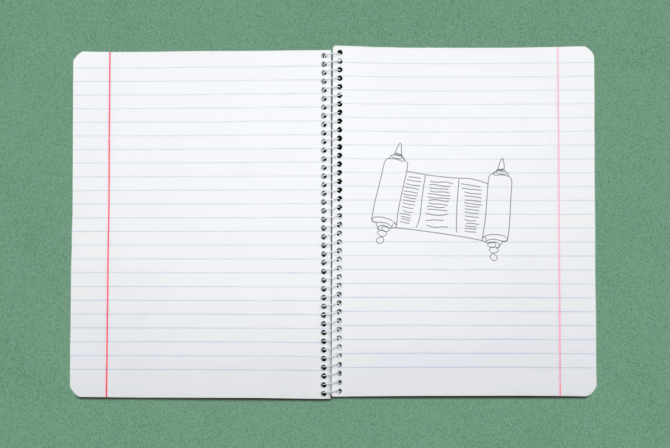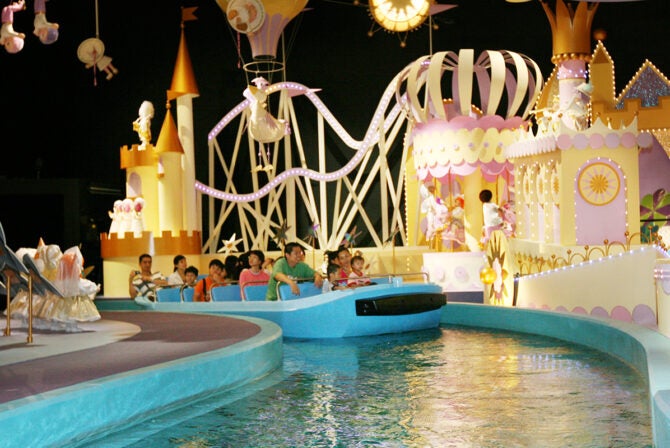Welcome to another installment of the Kveller Book Club. This month, we read Joshua Henkin’s novel The World Without You.
Reminder: Be sure to join us for our Twitter chat with Joshua Henkin (@JoshuaHenkin) tomorrow from 12-1 p.m. EST. Follow along with #KvellerLit.
The book explores the aftermath of a son’s death–and how his parents, wife, and sisters are handling life a year later as they gather for a memorial at their summer home in the Berkshires. The book also tackles topics including death, modern Orthodoxy, the challenges of being a parent, a child, and a sibling, not to mention, female (all of the novel’s main characters are women). Needless to say, this book provides lots of material for a Kveller chat, and we want to hear from you! Please add your thoughts to the discussion by leaving a comment below!

Adina
: The copy on the jacket flap of Josh Henkin’s novel promises that the book is about “sibling rivalries and marital feuds, about volatile women and silent men, and ultimately, about the true meaning of family.” There are many big ideas listed here, but in my estimation, this novel was mostly about regret. Then again, every reader brings her own baggage to the book, so to speak, and I read this book in the wake of my father’s death. On some level I must have searched for themes I could connect with right now.
What I found was a 60-something-year-old matriarch (Marilyn) reeling from her son’s death and struggling to connect to the people around her. I found a daughter (Clarissa) regretting her decision not to have children and another (Noelle) regretting her lack of bond to her own sisters. It seemed as if the death of Leo (their son and brother, upon whose death the premise of this book rests) turned a huge mirror on them all.
This is pretty true to the experience of loss in real life. You’d think that when a family member is lost, everyone is drawn closer to together. And in some obvious ways that’s right. But in a very real and very difficult way, the death of a loved one leaves you more alone than ever. No one can get inside of you and push exactly the right buttons to reset your heart and make you feel better. You are left to your own devices and you just have to pray your brain doesn’t let you down.
 Molly: When the jacket flap promises that the book will explore “the true meaning of family,” it conjures up warm fuzzies and group hugs. But that is not this book. Instead, we find that while it does take place over a weekend when the whole family is united together physically, everybody is still very much on their own. They’re on their own to deal with the loss of Leo. They’re on their own to deal with the dissolve of Marilyn and David’s marriage. And they’re on their own to deal with, well, each other. The book brings up an intriguing point–it’s difficult to be part of a family. You all love each other and want to do good by each other, but you are different people with different lives that don’t always mesh as well as you’d hope.
Molly: When the jacket flap promises that the book will explore “the true meaning of family,” it conjures up warm fuzzies and group hugs. But that is not this book. Instead, we find that while it does take place over a weekend when the whole family is united together physically, everybody is still very much on their own. They’re on their own to deal with the loss of Leo. They’re on their own to deal with the dissolve of Marilyn and David’s marriage. And they’re on their own to deal with, well, each other. The book brings up an intriguing point–it’s difficult to be part of a family. You all love each other and want to do good by each other, but you are different people with different lives that don’t always mesh as well as you’d hope.
Adina: Since this is Kveller, after all, we should talk about how children and parents are portrayed in this novel. There are several children in the book (the character Noelle and her husband have four, and Leo’s widow, Thisbe, has a toddler son). The thing is, though, these characters are shadowy and we don’t see much parenting happening here.
 Jordana: I thought that as parents, David and Marilyn (Leo’s parents) operated at a level of self-involvement, but I do think that it’s possible to revert to that as an empty nester, and especially as people who are grieving so deeply for the loss of their child. Maybe the idea being, subconsciously, that they want to separate from their living children so as to not be caused any more pain?
Jordana: I thought that as parents, David and Marilyn (Leo’s parents) operated at a level of self-involvement, but I do think that it’s possible to revert to that as an empty nester, and especially as people who are grieving so deeply for the loss of their child. Maybe the idea being, subconsciously, that they want to separate from their living children so as to not be caused any more pain?
Noelle’s parenting was most familiar to me because it was sort of like triage: keep everyone from bleeding/killing each other. I liked how she often marveled at these creatures who spoke Hebrew and lived on this boy planet of their own as though she couldn’t believe they’d come from her–which surely every mom feels once in a while.
I was also touched by the portrayal of Thisbe (Leo’s widow). Very realistic–the idea of being a mother alone and wanting love but not wanting it to alter the delicate balance she has struck with her son in their death-imposed twosome.
Adina: I agree that Noelle’s parenting was most familiar in its messiness–and also, it seemed as if her role as mother/triage nurse allowed her to occasionally escape from the tensions of being with family and put on her mommy hat. This struck me as a very true behavior of any parent. I think kids provide us with a cover, from time to time. When life outside of our house is too much, or when the big questions just hang out there and we can’t immediately answer them (i.e. who do I want to be when I grow up and why am I not there yet?), it’s easy enough to hole up indoors and sit on the floor of my kids’ bedroom and do puzzles for a while, or blame it all on not having enough time.
But then again, maybe that’s the point. Kids force us to flip the gaze from navel to them. We simply can’t stay tied up in our own crap all the time. We are forced to regain perspective, over and over and over again.
Speaking of perspective, the epigraph of this book, a quote from a story by Richard Ford, reads: “Things seldom end in one event.” How would you guys articulate this idea as you see it?
Molly: I think it’s a very accurate description of the way life works, and one you don’t often get from novels where there is literally a last page, a last line, an ending. It reminds me of this realization I had–sometime in high school, I think–that adults don’t have their lives together any more than kids or adolescents do. Growing up, I would look at adults and think, “Wow, it must be so great to be done. Done with growing, done with figuring out what to do with your life, done with figuring out what you want.” Obviously, that’s not the case, and realizing that was equally terrifying and relieving–it sucks that there will always be struggles and conflicts and things for you to figure out, but that also means there’s always the opportunity to change, to try new things, to make things better, to become happier or more content.
Jordana: I think “what comes next”–and we understand this most in the context of marriage, or birth, or death–depends on other people beyond ourselves and our relationships to them. Yes, no one is an island, but my point is that once you are part of a family, or a marriage, your emotional and literal life depend on the other person, and depend on that “depending upon.”
Adina: In my experience, nothing, not even death, is finite. This isn’t a statement about an afterlife–to be honest I wish I could talk about that. I think there’s a real comfort to be found in believing that life doesn’t end with death. But if that’s true, it’s a truth I haven’t come to yet. What I’m saying is that on your darkest days, you might find yourself conjuring up how it would feel, or look, if something so essential was ripped away from you. And the thing is, whatever you’re imagining is wrong. Not because it’s so much worse than that–though it is–but because it’s so much more than that. And I guess that’s what the epigraph means to me. There are angles to the problem that you never even considered, but there are opportunities, too. There is perspective to be gained. This perspective doesn’t yield a silver lining but rather, it makes the problem even more complicated, and, I guess, in time, even more interesting. So you keep chasing answers. Like Molly said, it’s the way life works. It keeps us hooked until it doesn’t anymore.
If you’ve read the book, we’d love to hear your thoughts in the comments section below. And even if you haven’t read it yet, we’d love to hear your thoughts on how a family deals with loss.
Check back here tomorrow for a Q&A with author Joshua Henkin and then join us for our Twitter chat from 12-1 p.m. EST.







